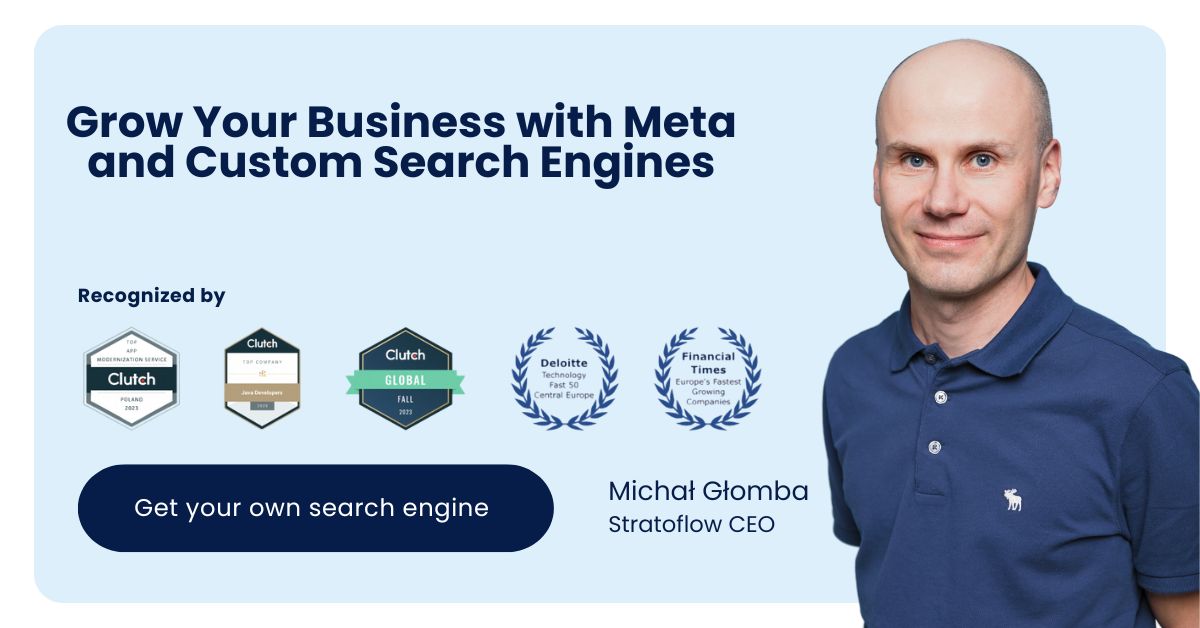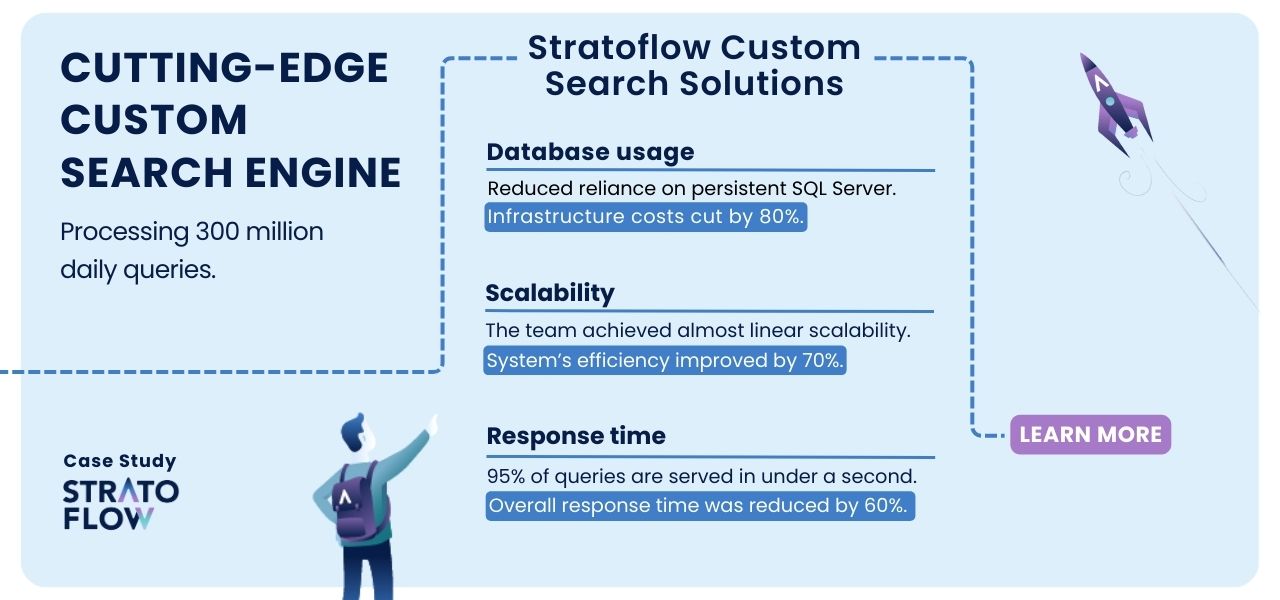
How To Build Travel Meta Search Engine: A Step-By-Step Guide
Are you looking to enter the lucrative travel industry by building a state-of-the-art travel meta search engine or expanding your existing business with a custom travel search engine?
This step-by-step guide is your key to navigating the complex world of online travel search.
From gathering initial requirements to deploying and maintaining your custom platform, we’ll walk you through the essential stages of creating a search engine that stands out in the competitive travel market.
Whether you’re looking to aggregate real-time customer data or create a customized search experience for specific travel needs, this guide provides practical insights and industry best practices to bring your vision to life.
What are travel meta search engines?
A travel meta search engine is a digital platform that aggregates and compares travel-related information, such as flights, hotels, and car rentals, from different websites to help users find the best options based on their preferences and budget.
Imagine you’re planning a vacation and want to find cheap flights, nice hotels, or car rentals. Instead of going to lots of different websites, a travel meta search engine does it for you. It searches many travel sites at once and gives you a list of options with prices. That way, you can easily compare and choose what best suits your budget and needs.
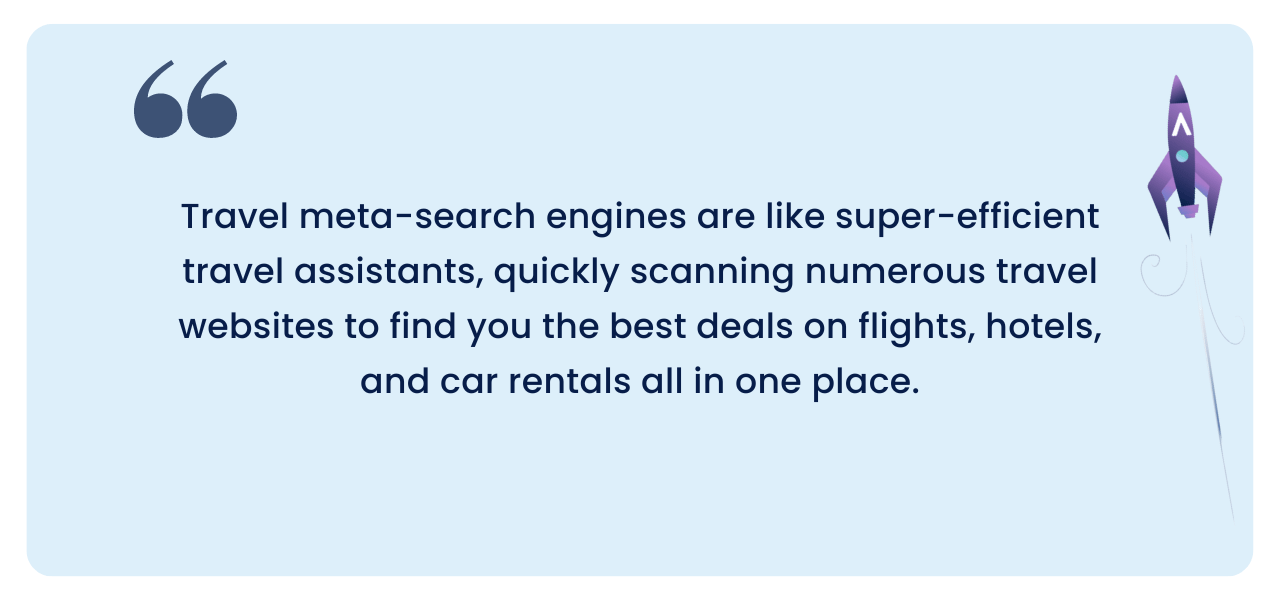
A travel meta search engine is a digital platform that aggregates and compares travel-related information, such as flights, hotels, and car rentals, from different websites to help users find the best options based on their preferences and budget.
According to a recent Eye for Travel survey, 94 percent of travelers use metasearch engines to compare hotel rates. In fact, 60 percent of independent hoteliers consider metasearch the most effective marketing channel. Meta search advertising has generated $6 billion in economic value over the past decade.
In the rapidly evolving travel industry, not only are meta search engines critical for travel companies, but custom travel search engines also play a pivotal role.
These custom engines significantly improve direct bookings by providing a more tailored and user-friendly experience. They cater to the specific needs and preferences of travelers, providing a range of choices and streamlined booking processes.
[Read also: A Step-by-Step Guide: How to Start an Online Travel Agency (OTA)]
Benefits of custom travel search engines
In the dynamic world of travel and hospitality, custom travel search and meta search engines are game-changing technology.
Let’s take a look at the key benefits these solutions bring to online travel agencies, travelers, and business owners:
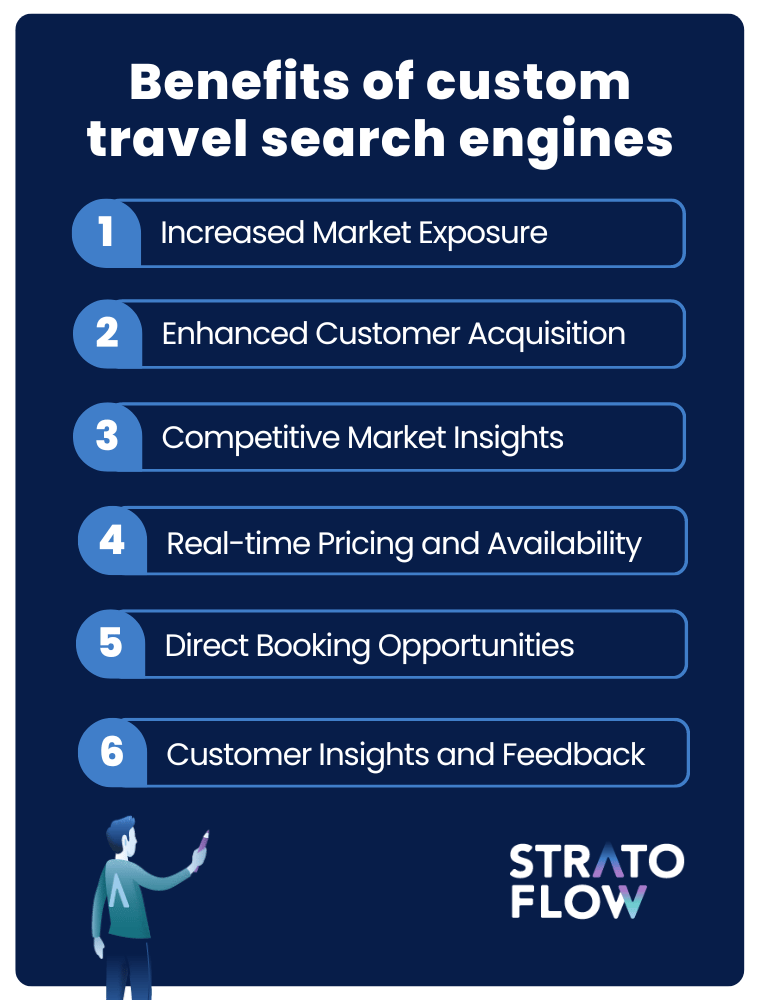
Increased Market Exposure
For both travel meta search engines and custom travel search engines, increased market exposure is a key benefit.
Meta search engines increase visibility by aggregating listings from multiple sources and presenting users with a wide range of options in one place. Increased visibility in a consolidated platform can lead to increased brand awareness and customer reach, which are critical for market growth and brand establishment.
Custom travel search engines, on the other hand, provide a specialized platform that highlights specific services or destinations. Both types help travel companies reach a broader audience and make their products and services more visible to potential customers.
Enhanced Customer Acquisition
Travel search engines are powerful tools for attracting new customers.
Travel meta search engines attract users with the promise of comprehensive price comparisons and a wide range of options. By aggregating various travel options, meta search engines serve as an effective customer acquisition tool.
They provide travel companies with access to a large pool of potential customers actively searching for travel services. This direct exposure to a targeted audience looking to make a purchase can lead to higher conversion rates and more bookings, which are essential for business growth and revenue generation.
Custom travel search engines, on the other hand, attract users seeking a more personalized travel planning experience by offering tailored and often niche-specific information. In both cases, these platforms serve as gateways, connecting users directly with travel suppliers.
Competitive Market Insights
These engines provide invaluable market insights and consumer data that enable companies to understand market trends, customer preferences, and competitive dynamics.
Access to this data enables companies to make informed decisions about pricing strategies, service improvements, property management, and marketing tactics. By analyzing trends and customer behavior, companies can adapt and innovate to meet market demands and stay ahead of the competition.
Real-time Pricing and Availability Updates
The travel search engine’s website provides users with real-time pricing and availability information, which is a significant benefit for travel and hospitality companies.
This feature ensures that potential customers are always presented with the most up-to-date information, reducing the risk of overbooking and price discrepancies. It also allows businesses to adjust their offerings to meet market demand, helping to optimize hotel revenue management and improve hotel inventory management.
Direct Booking Opportunities
Some meta search engines offer direct booking functionality, which can be a lucrative feature for travel companies.
This capability allows customers to make reservations directly through the meta search platform, simplifying the booking process and potentially reducing reliance on traditional hotel channel managers, which often carry higher commissions. Direct bookings can improve margins and streamline the reservation process.
Customer Insights and Feedback
Travel meta search engines often feature customer reviews and ratings, providing businesses with valuable feedback on their services.
This customer-generated content can help businesses identify areas for improvement, increase customer satisfaction, and build trust with potential customers. Positive reviews and high ratings can significantly influence consumer decisions, leading to increased bookings and a stronger reputation in the competitive travel marketplace.
[Read also: How to build a search engine: step by step]
Building a custom travel search engine – step-by-step process
As you can imagine, building a custom travel search engine is no easy feat.
As with any custom software development project or enterprise software application, there are many moving parts. All aspects of such search engines such as database integration, software performance, and intuitive user interface must work together to achieve the desired results.
So how does one go about building a custom travel search engine website?
How do you even begin?
In this section, we will show you exactly what it takes to build a travel search engine from scratch – step by step.
This section is designed to guide you through the journey of developing a custom travel search engine, from initial concept to final launch.
So without further ado, let’s get started!
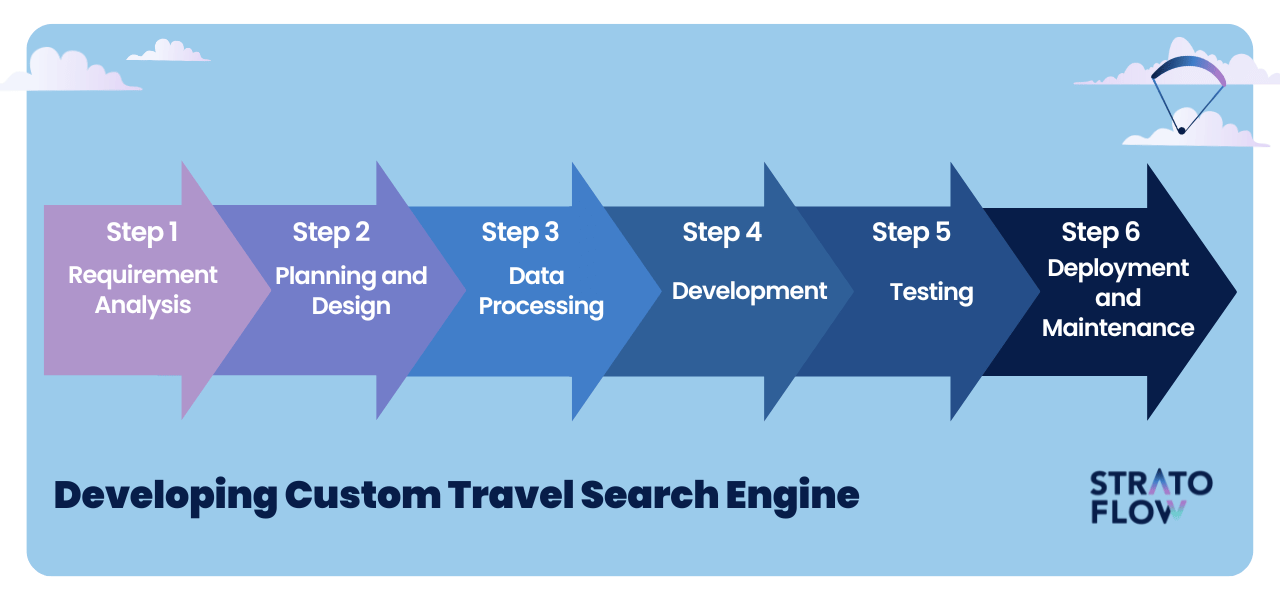
Step 1: Requirement Analysis
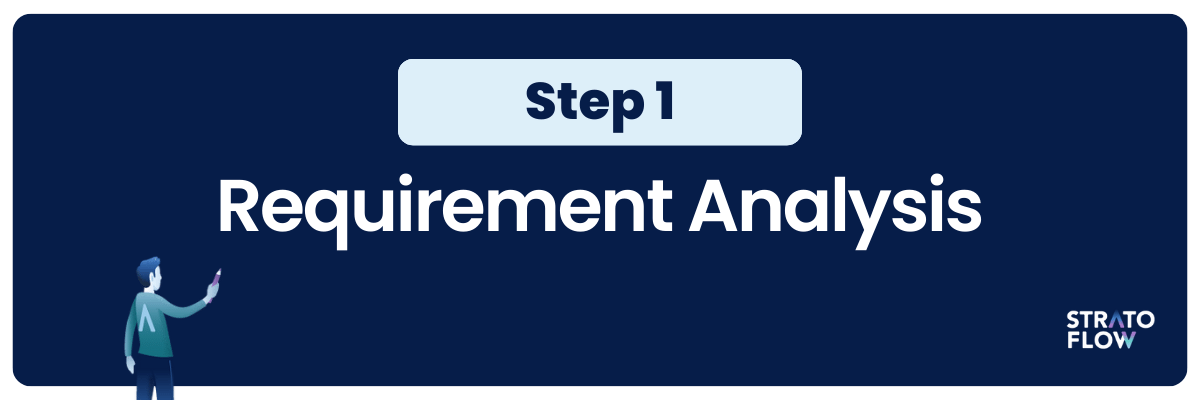
The first step in building a custom search engine is to thoroughly understand and analyze the requirements.
This involves working with stakeholders to gather their needs and expectations. The team defines the scope, goals, and specific functionality that the search engine must provide. It’s also critical to identify the target audience and understand their search habits and preferences, as this will guide the development process to create a product that effectively meets user needs.
During the requirements analysis phase of building a custom search engine, a business owner and the development team might ask themselves the following sample questions:
- What are the specific goals and objectives of this search engine?
- Who is the target audience, and what are their search habits and preferences?
- What unique features should our search engine have to stand out from existing ones?
- What are the technical and resource constraints we need to consider?
These questions are critical for the development team because they establish a fundamental understanding of the project. Clarifying the search engine’s goals and objectives aligns the team’s efforts with the organization’s vision and ensures feature prioritization that meets those goals.
Assessing technical and resource constraints ensures realistic planning and execution, setting clear boundaries for what can be achieved within the project’s scope, budget, and timeline.
Together, these questions guide informed decision-making and focus the development process on creating an effective and user-centric search engine.
Step 2: Planning and Design

Once the requirements are clear, the next step is to plan and design the search engine.
This includes creating a detailed project plan with timelines, resource allocation, and budget considerations. The design phase focuses on the architecture of the search engine, including the choice of data structures, search algorithms, and user interface design. Selecting the appropriate technology stack, including programming languages, frameworks, and databases, is also a critical part of this phase.
In this step, both management and the development team must agree on 5 key aspects of the custom travel search engine:
- Software Planning Phase: This involves creating a comprehensive project plan that outlines timelines, resource allocations, and budgeting. Tools like Gantt charts, project management software (e.g., JIRA, Asana, Trello), and resource management tools are often used here. The plan should include milestones, deliverables, and a clear timeline for each phase of the project.
- Software Design Phase: The technical architecture of the search engine is designed in this stage. This includes deciding on the programming languages, frameworks, and databases to be used. The development team usually draws robust and complicated diagrams of the software’s architecture that can be helpful in visualizing the system’s structure.
- User Interface (UI) Design: The design of the user interface is crucial as it impacts user experience. Wireframing and prototyping tools like Adobe XD, Sketch, or Figma are commonly used to create initial designs and mockups of the search engine’s interface.
- Data Structure and Algorithm Design: Deciding on the data structures and algorithms for data indexing, searching, and ranking is vital. This stage might involve using algorithm simulation tools or flowchart software to map out the logic and flow of these key components.
- Methodology Selection: Choosing the right development methodology is crucial for a smooth and agile development process. Agile methodologies like Scrum or Kanban are popular choices as they allow for flexibility, iterative development, and continuous feedback. These methodologies facilitate quick adjustments based on testing results or changing requirements.
The best approach in the planning phase is to ensure thoroughness in planning while maintaining flexibility.
The Agile methodology aligns well with this approach as it supports iterative development, adaptability to changes, and emphasizes continuous stakeholder feedback. Using a combination of robust project management tools, design software, and Agile practices enables a well-structured yet flexible environment for the development of a custom search engine.
This approach helps in managing complexities effectively, ensuring a smooth development process and timely delivery of the project.
Step 3: Data Collection and Processing
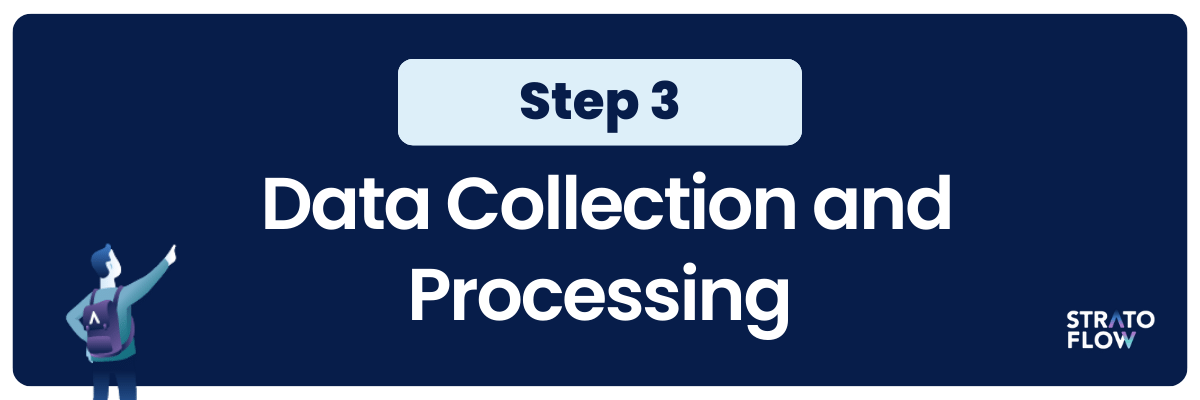
The third step in the development of a custom search engine, data collection and processing, is critical because it involves collecting and organizing the data that the search engine will use. This step differs significantly depending on the type of search engine being developed, especially when comparing meta search engines to custom travel search engines.
Data Collection
Meta Search Engines: These engines typically do not host data themselves, but rather aggregate data from various other search engines or databases. They rely heavily on APIs ( Application Programming Interfaces) to pull real-time data from various sources. For example, a travel metasearch engine would use APIs to pull flight, hotel, and car rental information from various travel sites and airlines.
Custom Travel Search Engines: In contrast, these search engines may have their own databases of travel-related information. Data collection may involve web crawlers that scrape data from various travel-related websites, including airlines, hotels, and review sites. They may also integrate APIs for specific data sources where scraping is not feasible or where real-time data is required. Collected data needs to be easily accesses providing fast response time and that’s why custom search engines often leverage IMDG database solutions like Kafka, Oracle Coherence, and Hazelcast.
Data Processing
Indexing: Once the data is collected, it needs to be indexed. This involves organizing the data in a way that makes it easily searchable. The approach to indexing may differ based on the volume and variety of data.
Normalization and Cleaning: This is crucial for ensuring data quality. It involves removing duplicates, correcting errors, and converting data into a consistent format. For travel search engines, this might include standardizing date formats, location names, and pricing information.
Architectural Designs
Web Crawlers: Both custom and meta search engines might use web crawlers, but their application will vary. In a custom travel search engine, crawlers might be more extensive and complex, designed to extract detailed information from various sources. In meta search engines, crawlers might be used more for updating links or integrating new sources.
APIs: APIs are essential for meta search engines as they rely on them to fetch data from external sources. Custom travel search engines also utilize APIs, especially for components like flight status updates, where real-time data is critical.
Database Design
The choice of database (SQL or NoSQL) and its design will depend on the data’s nature. For instance, a relational database might be more suitable for structured data with clear relationships, while NoSQL could be better for more varied or unstructured data.
Step 4: Software Development

In the development phase of a custom search engine, the key to success is the use of an agile software development methodology characterized by short development sprints and close collaboration between the development team and stakeholders.
This approach breaks the project into small, manageable chunks, allowing for steady progress and early identification of problems.
The agile framework ensures regular stakeholder engagement, providing valuable feedback that keeps the project aligned with user needs and business goals. Its inherent flexibility allows the team to adapt to changing needs and priorities – a critical aspect in the dynamic field of software development. What makes Agile particularly effective is its emphasis on continuous testing and quality assurance, ensuring that each release maintains a high standard.
This methodology not only improves team productivity and morale through its collaborative and self-organizing nature but also significantly reduces risk by addressing problems early in the development process.
The result is a development environment that is adept at responding to emerging technologies, changing user preferences, and unforeseen challenges, ensuring that the final search engine product is both functional and closely aligned with market needs.
Step 5: Software Testing
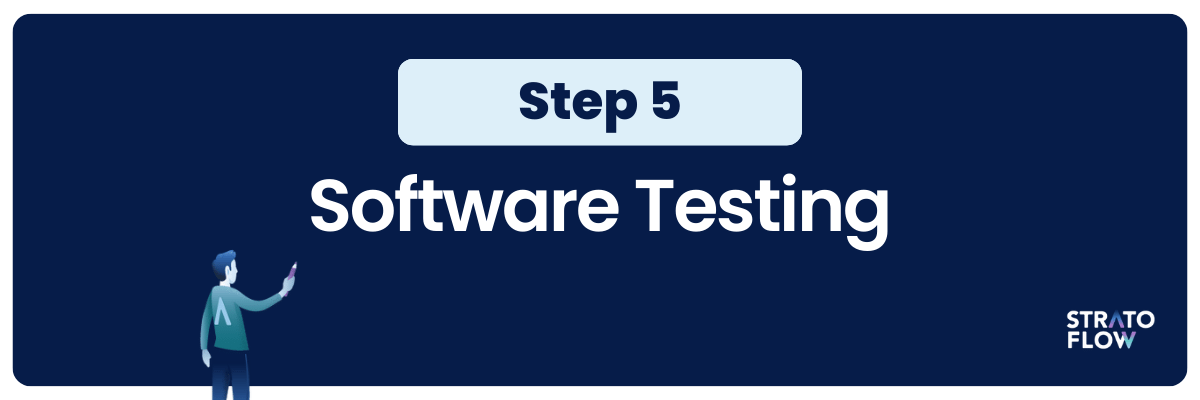
The testing phase in the development of a custom search engine is critical to ensuring the delivery of high-quality travel agency software to the end customer. During this phase, the functionality, performance, security, and user experience of the search engine are rigorously evaluated and validated.
This phase is critical for evaluating how the search engine handles different types of data, user queries, and traffic loads.
By catching bugs and issues early, testing significantly reduces the risk of post-deployment problems, which can be costly and damaging to a company’s reputation.
Testing also contributes to the overall user experience.
A search engine that has undergone extensive testing is likely to provide a smoother, more reliable user experience, which has a direct impact on user satisfaction and engagement.
In the process of testing a custom search engine, several key types of software testing are typically employed:
- Unit Testing
- Integration Testing
- System Testing
- Performance Testing
- Usability Testing
- Security Testing
- Compatibility Testing
Step 6: Deployment and Maintenance

The deployment and maintenance phase is the final, ongoing stage in the development of a custom search engine, marking the transition from development to real-world application.
This phase is critical to the long-term success and viability of the search engine.
Deployment begins with the initial go-live, which involves meticulously setting up the infrastructure, whether on-premises or cloud-based, to ensure that all components function seamlessly. This phase is followed by rigorous monitoring and performance tuning to optimize efficiency and address any operational issues.
Maintenance is an ongoing cycle that includes regular updates to keep the search engine relevant and efficient, including refining search algorithms and integrating new features. Equally important are security updates to guard against vulnerabilities and protect user data. In addition, the engine’s performance needs to be continually optimized to handle growing numbers of users and added features.
This comprehensive approach to deployment and maintenance ensures that the search engine remains secure, efficient, and responsive to current and future needs, embodying a dynamic cycle of improvement and adaptation.
[Read also: Best travel management solutions]
Importance of working with experts in custom software development projects
When building a custom travel search engine, it’s really important to work with people who have a lot of experience in the field.
Experienced professionals know a lot about both technology and the travel industry, which helps them build a search engine that works well and does what users need it to do. They can spot problems before they become big problems and know how to fix them quickly. This can save you time and money.
These experts also stay on top of new trends and technologies to keep the search engine modern and competitive.
They’re good at keeping the project on track, and making sure it’s completed on time and within budget.
So working with experienced professionals means you’re more likely to end up with a travel search engine that works great and meets everyone’s needs.
That’s why when a major UK booking aggregator approached us about improving their travel search engine, our developers knew what to do.
The client’s system struggled with scalability limitations due to its architecture, which relied on SQL Server machines and was incapable of efficient horizontal scaling.
To address these issues, Stratoflow implemented a solution that included an in-memory data grid (IMDG) platform for the availability search function, reducing the reliance on the SQL Server database. This new system allowed the necessary data to be stored in memory, supported by a custom data loading mechanism and a message queue pipeline for incremental intraday data updates.
The results were significant: an 80% reduction in infrastructure costs, improved horizontal scalability with 70% efficiency, and the ability to handle 50% more traffic (over 300 million queries per day).
Most popular travel meta search engines on the market in 2023
By now we know how to approach building your own custom travel search engine.
Let’s now see what you are up against since there are many search engines in the travel and hospitality industry out there. Here we’ve listed five of the most popular meta search engines on the market:
Google Hotel Ads

Google Hotel Ads is a met search engine that allows users to compare hotel rates and availability directly in Google search results and on Google Maps.
When a user searches for hotels on Google, Hotel Ads displays a variety of options from different booking engines, allowing the user to find the best deal. It also integrates with Google’s booking system, offering the convenience of booking directly through Google.
Kayak
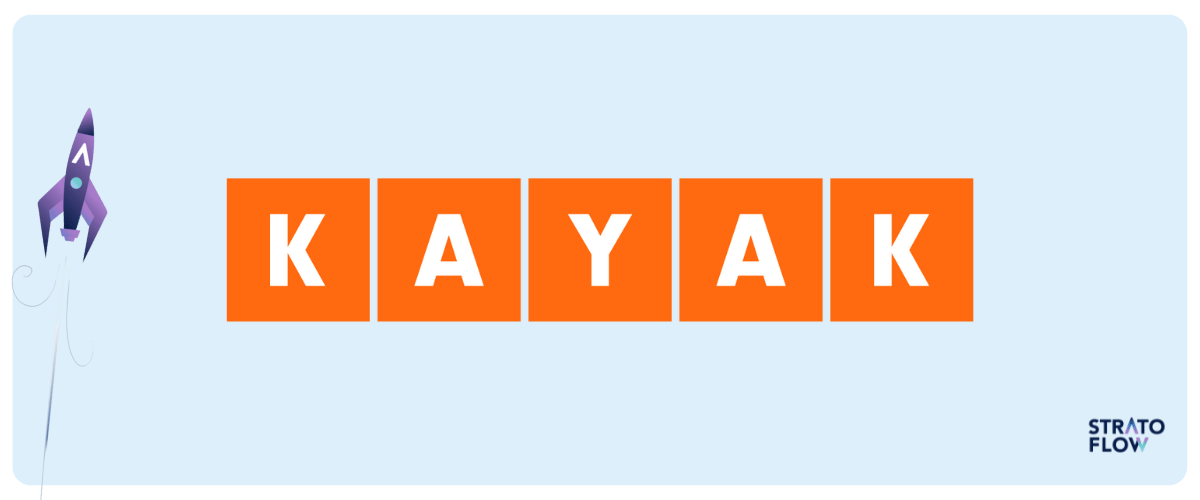
Kayak is a travel search engine that aggregates information from multiple online travel agencies and hotel websites, allowing users to find and compare prices for flights, hotels, car rentals and more.
It provides a comprehensive search experience and offers tools such as price forecasting, filters, and maps to help travelers make informed decisions. Kayak also includes user reviews and ratings to help users choose the best travel options.
[Read also: 11 Travel Technology Trends Emerging in the Tourism Industry in 2023]
Tripadvisor
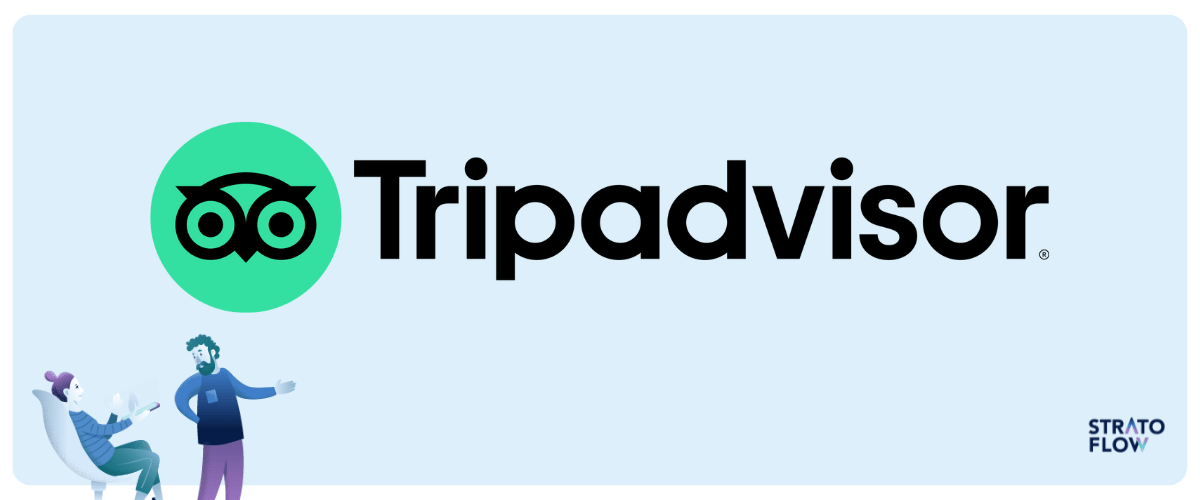
TripAdvisor is a travel platform that offers a wide range of user-generated content, including reviews, ratings and photos of hotels, restaurants, attractions and more.
It provides a comprehensive price comparison across multiple booking engines, allowing users to find the best deals on accommodations and flights.
TripAdvisor also offers a wealth of information through its community, including travel forums and advice, to enhance the travel planning experience.
Trivago
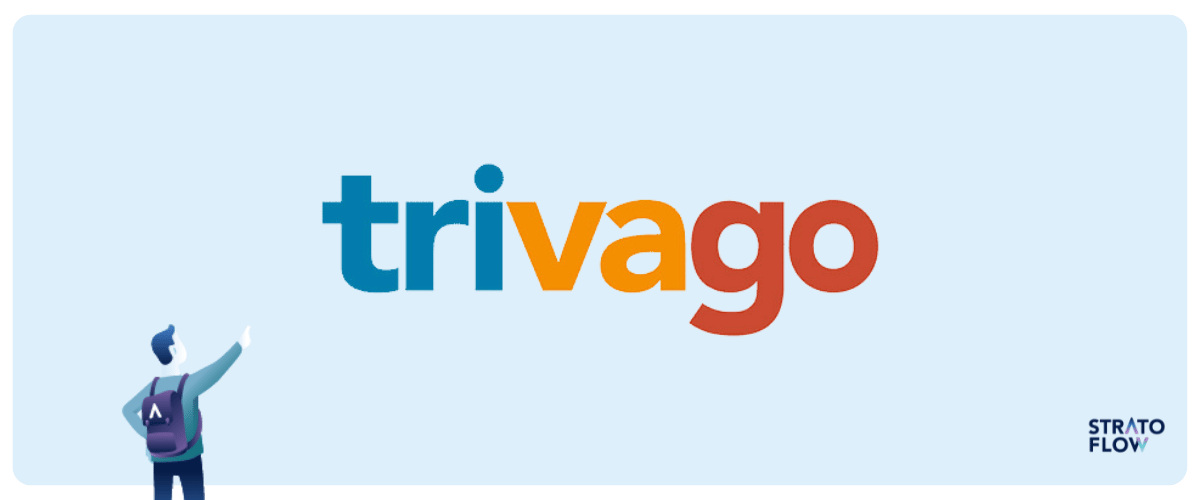
Trivago is a hotel search engine that aggregates and compares room rates from multiple booking sites, allowing users to find the best deals on accommodations.
It offers a user-friendly interface with filters and maps that make it easy to search for hotels based on location, price, amenities, and more.
Skyscanner
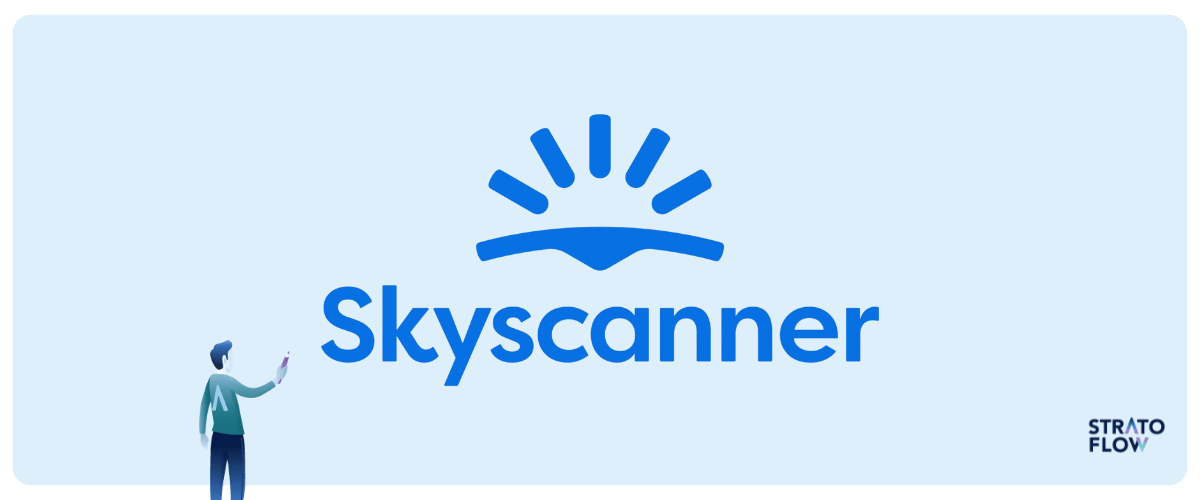
Skyscanner, is a global travel search site that provides a comprehensive comparison of flight prices from different airlines and travel agents.
It also offers options for finding and booking hotels and car rentals. Skyscanner’s tools, such as price alerts and flexible date search, help travelers find the best deals and travel options.
[Read also: Digital Transformation in the Travel and Tourism Industry]
Conclusion
In conclusion, building a travel meta search engine is a strategic endeavor that can significantly enhance your presence in the travel industry.
By following the step-by-step process outlined in this article, you can navigate the complexities of this process and develop a tool that not only meets the dynamic needs of travelers, but also stands out in the competitive travel marketplace.
With the right approach, your travel search engine can become a central resource for users and a valuable asset in your business portfolio.
Related Posts
Thank you for taking the time to read our blog post!
